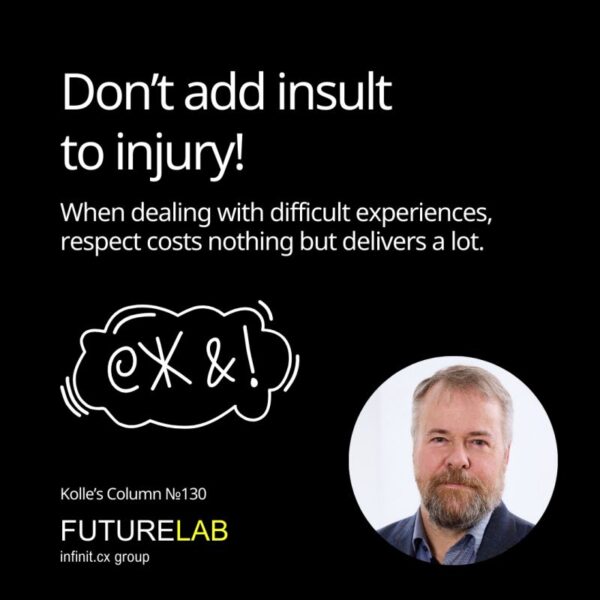I find myself living in an age where we take good ideas and squeeze the life out of them through inappropriate implementation.
It occurs to me that the scourge of the customer-centric fad is customer surveys. It seems to me that just about every large organisation that I deal with asks me for my feedback through some kind of survey. And this scourge is not limited to these big organisations. On my last visit to my GP’s (doctor’s) surgery I was asked to fill in a survey – it was over ten pages long!
I say that you only need to ask one or two questions of your customers. What are these questions? Let’s start with what I say you shouldn’t ask. Don’t ask your customers to rate their satisfaction using some kind of scale e.g. 1 to 10 – with your brand, your product’s, your people, the last interaction etc. Why not?
First, I (the customer) find it hard work to figure out how to rate you. Second, my asking me to figure out/apply ratings you have switched on my reasoning brain not my emotional brain. Third, satisfaction is the wrong word to use – it is not a word that you find folks using much in every day talk.
So what are the one or two questions? At the end of major work on my home – main bathroom, the ensuite bathroom, downstairs toilet, and utility room – the fitter asked me and my wife this question:
“Are you happy?”
As soon as I heard that question I realised that no commercial organisation has ever asked me such a simple question! And it occurred to me that it is exactly the right question: short, simple, worded perfectly, no misunderstanding.
“Are you happy?” taps into emotions and the emotional brain. The answer is either a definitive “Yes!” or its not. If it’s not a definitive “Yes!”then you know that you (the person/organisation supplying the goods/services) have failed to live up to one or more of the customer’s expectations.
Our fitter didn’t just ask the question for the sake of asking the question. The way he asked it suggested that he genuinely cared about whether we were happy or not with the work he had carried out. How do I know this? Because when he picked up that we did not immediately come out with “Yes!” he asked the second question along the lines of:
“What needs fixing in order for you to be happy?”
Our fitter really listened to our answer to this question. How do I know this? Simple: he immediately set about asking us to show him what needed fixing and what “happy” would like like in each case. Then he set about fixing the ten or so little things that we wanted fixed.
What happened after the fitter had completed the work of fixing? Did he simply assume that he had done the necessary work, get paid, and walk away? No! He went back to the first question” “Are you happy?”
The fitter genuinely cared about ensuring that we were happy with the work that he had carried out for us. Why? For three reasons:
- He thinks of his customers as people and treating people right matters to him – it is part of who he is;
- He takes pride in the work that he does – he invest himself (his identity) into this work and thus doing merely OK work is not acceptable to him; and
- He does no marketing/selling – all of his work, and he is busy really busy, comes from word of mouth recommendations.
I wish to end with my take on what listening to the voice of a customer is. It is not sending a survey. It is not the automated processing of the results of customer surveys. It is not presenting summarised results every so often to the executive team. Nor is listening simply meeting up with customers and hearing that which is spoken by customers.
From a customer’s perspective, you have listened only when you do that which our fitter did: take speedy/correct action to fix that which the customer says needs fixing. If you do not do this then you have not listened. Worse, from the customer’s perspective you have wasted his/her time and disregarded him.
Enough for today. I thank you for your listening and I wish you the very best. Until the next time…
Read the original post here.




